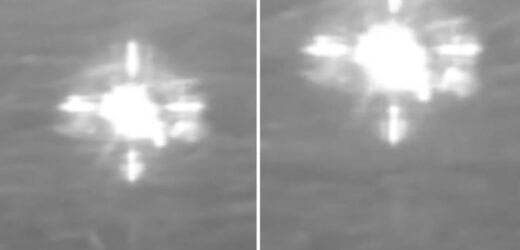THIS is the incredible moment two Boeing 737 pilots were plucked from the sea after crash landing when its engines failed off Hawaii's coast.
"It doesn't look good out here," one of the worried pilots said before the plane broke apart as it plunged in to the water.
Two pilots told air traffic controllers that their engine had cut out and they needed help moments before crashing their cargo plane into the Pacific Ocean on Friday.
According to the state Department of Transportation, the crash happened around 1.45am about two miles off Kalaeloa Airport, Hawaii News Now reported.
Both pilots, the only people aboard, were seriously injured but – incredibly – survived the crash.
They were discovered an hour later, clinging to packages and parts of the plane in about 150 feet (46m) of water, several miles off Oahu, authorities said.
One was clutching on to the tail while the other was desperately clinging to packages, said Coast Guard Lt. Commander Karin Evelyn.
Audio from the plane reveals one pilot saying: "We've lost number one engine and we’re coming straight to the airport.
They added: "We're going to need the fire department.
"There's a chance were going to lose the other engine, too, it's running very hot. We're very low on speed."
The crew told the Honolulu Tower to alert the fire department and Coast Guard.
The pilot said they weren't carrying hazardous materials and had two hours worth of fuel.
They also asked the tower to advise the Coast Guard, then asked if there was a closer airport than Honolulu.
After a stretch of silence, the controller asks if the pilot is still there.
But there was no response.
"Looks like they went down in the water," the tower says.
Later, a rescuer aboard a Coast Guard helicopter sent to search for the pilots tells air traffic control: "We do have an aircraft in the water… we're currently overhead (the) debris field."
It was a race against time, however, as the airplane began to sink – pushing the pilot on the tail in to the sea.
Minutes later the audio continues: "We have zero, two souls in sight in the water."
The tower responded: "OK, so you have both guys, both souls in sight?"
"Both souls in sight, yes, sir," the rescuers replied.
The crews hoisted that pilot safely on to the aircraft hovering above the scene.
One the water, meanwhile, a US Coastguard rescue swimmer then plucked the other pilot to safety.
One of the pilots was reportedly airlifted by the US Coast Guard to a local hospital, while a rescue boat took the other passenger to shore.
A 58-year-old was in the intensive care unit in critical condition, and a 50-year-old was in serious condition with a head injury and multiple laceration at Queens Medical Center.
The 46-year-old aircraft was flying from Maui to Honolulu when it went down.
Debris and fuel remain in the water.
The Coast Guard was to fly over the crash site off Oahu to evaluate the pollution this morning.
The Federal Aviation Administration (FAA) confirmed that two pilots were on board and made an emergency landing.
"The pilots had reported engine trouble and were attempting to return to Honolulu when they were forced to land the aircraft in the water," the agency added.
The FAA and the National Transportation Safety Board will investigate.
The NTSB said in a tweet that it will send a team of 10 investigators.
In a statement, Boeing said: "We are aware of the reports out of Honolulu, Hawaii and are closely monitoring the situation.
"We are in contact with the U.S. National Transportation Safety Board and are working to gather more information."
No other information was immediately released.
The plane is a 46-year-old Boeing 737-200, a much earlier version of the 737 than the Max, and one that U.S. airlines no longer use for passenger flights.
There are fewer than 60 737-200s still flying worldwide, according to aviation-data researcher Cirium.
Boeing 737 cargo planes
The Boeing 737-200 is a twin-engined short-range narrowbody airliner.
There are fewer than 60 737-200s still flying worldwide.
The Boeing 737-200 has a payload capability of 30,000 lbs (13,600 kg) – or, it can also carry up to 120 passengers.
It has a cruise speed of 776 km/hr.
The plane's range is five hours plus reserve.
About 200 737s have been destroyed in crashes and several hundred others have been involved in less serious accidents and incidents, according to the Aviation Safety Network database.
For a jet that has been in production for so long and is being used so extensively, 203 hull-loss accidents can be considered a very good safety record, said Harro Ranter, who runs the database.
Source: Read Full Article









